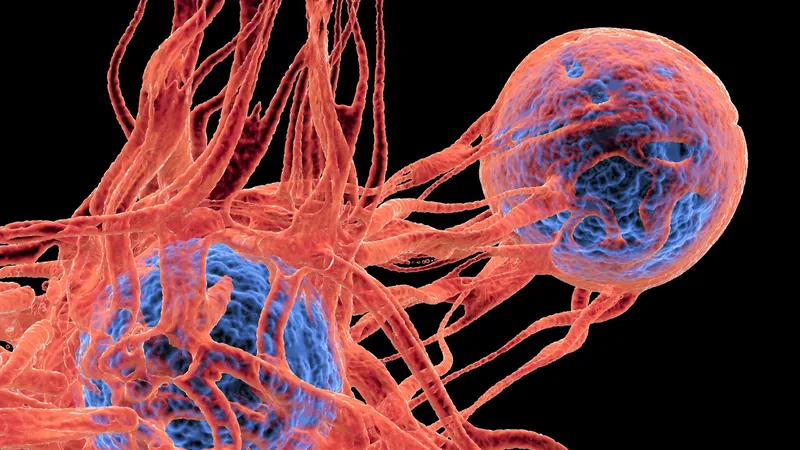
How Immune Molecules May Secretly Manipulate Our Behavior During Illness
2025-04-08
Author: Wei Ling
How Immune Molecules May Secretly Manipulate Our Behavior During Illness
Researchers at MIT and Harvard Medical School have unveiled a surprising connection between immune molecules known as cytokines and behavioral changes during illness. They discovered that a particular cytokine, IL-17, affects key brain regions, leading to altered emotional and social behaviors, which could have implications for understanding conditions like autism and anxiety disorders.
Cytokines are crucial for the immune system, primarily responsible for fighting infections and regulating inflammation. However, recent studies suggest they can also influence brain function, revealing an intricate link between the immune and nervous systems. Gloria Choi, an associate professor at MIT's Picower Institute for Learning and Memory, emphasizes that being ill is about more than just physical fatigue; it alters internal moods and behaviors, with significant neurological influences.
Focusing on IL-17, Choi and her colleague Jun Huh have conducted groundbreaking research that pinpoints how this molecule interacts with the brain. Their studies, recently published in the journal *Cell*, show that IL-17 impacts two distinct brain areas: the amygdala, which processes emotions such as anxiety, and the somatosensory cortex, associated with social behavior.
In the amygdala, IL-17 can induce feelings of anxiety. When binding to receptors in this region, it enhances neuronal excitability, which in turn can amplify anxiety responses. Interestingly, the research indicates that reducing IL-17 levels or blocking its receptors could inadvertently increase circulating IL-17 levels, suggesting complex feedback loops that may affect mental health treatments, particularly for conditions like psoriasis.
Conversely, IL-17 also plays a positive role in the somatosensory cortex, promoting sociability. This dual functionality hints at a more sophisticated mechanism where the immune system not only combats pathogens but also modulates social behaviors to potentially protect both the individual and the wider community.
In efforts to map out the IL-17 receptors across various brain regions, researchers have identified that these receptors exist in populations of neurons that work with sensory inputs essential for behavioral regulation. They found that IL-17E, a form of IL-17, acts almost like a neuromodulator, reducing excitability and influencing behavior.
Choi hypothesizes that IL-17 may have originally evolved to modulate brain behavior before its role in the immune response became prominent. This insight aligns with findings in other organisms, where IL-17 does not perform immune functions but affects social behaviors instead.
The implications of these findings extend to understanding complex psychiatric conditions and developing new therapeutic strategies. The research opens up intriguing possibilities of harnessing the immune system's capabilities to influence brain function. As Choi states, “Instead of targeting the brain directly, can we manipulate the immune system to achieve therapeutic effects?”
By identifying how immune molecules like IL-17 interact with the brain, scientists hope to pave the way for innovative treatments for conditions such as autism and anxiety, potentially transforming our approach to mental health. The research signifies a remarkable confluence of immunology and neuroscience that has the potential to redefine our understanding of behavior during illness.
Stay tuned for more updates, as ongoing studies may unlock further secrets about our immune system's role in shaping not just our health, but also our emotions and social interactions.


 Brasil (PT)
Brasil (PT)
 Canada (EN)
Canada (EN)
 Chile (ES)
Chile (ES)
 Česko (CS)
Česko (CS)
 대한민국 (KO)
대한민국 (KO)
 España (ES)
España (ES)
 France (FR)
France (FR)
 Hong Kong (EN)
Hong Kong (EN)
 Italia (IT)
Italia (IT)
 日本 (JA)
日本 (JA)
 Magyarország (HU)
Magyarország (HU)
 Norge (NO)
Norge (NO)
 Polska (PL)
Polska (PL)
 Schweiz (DE)
Schweiz (DE)
 Singapore (EN)
Singapore (EN)
 Sverige (SV)
Sverige (SV)
 Suomi (FI)
Suomi (FI)
 Türkiye (TR)
Türkiye (TR)
 الإمارات العربية المتحدة (AR)
الإمارات العربية المتحدة (AR)